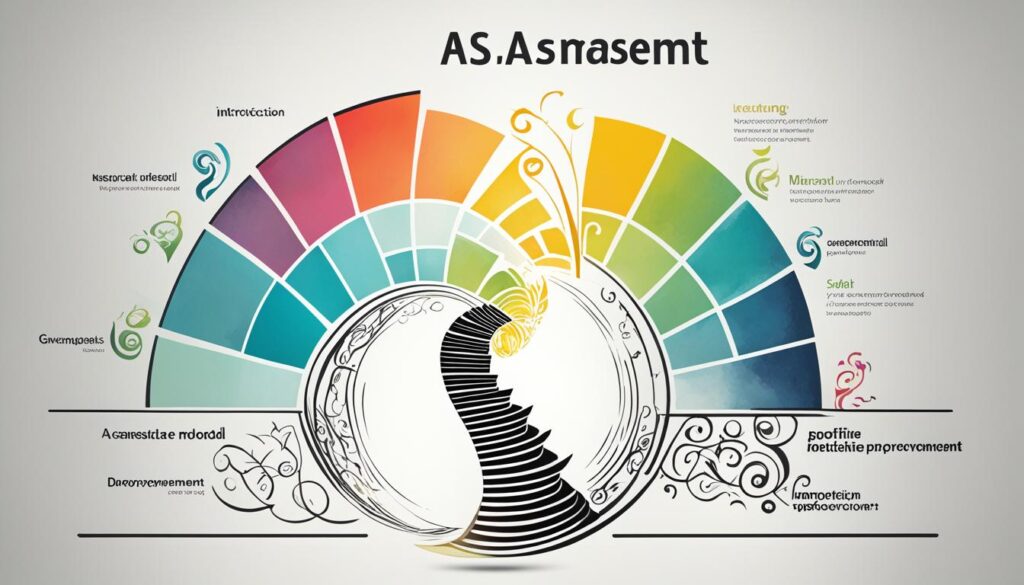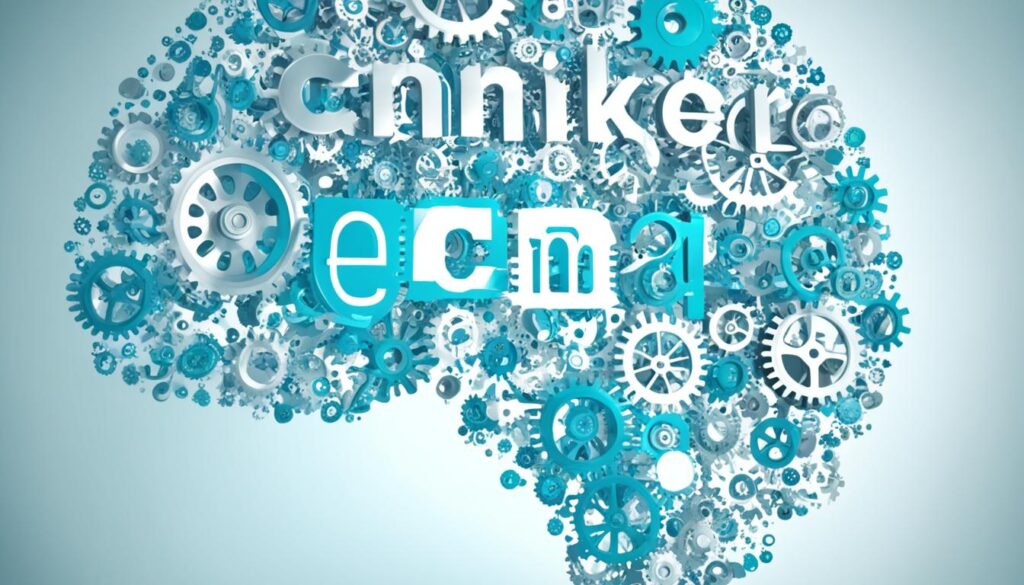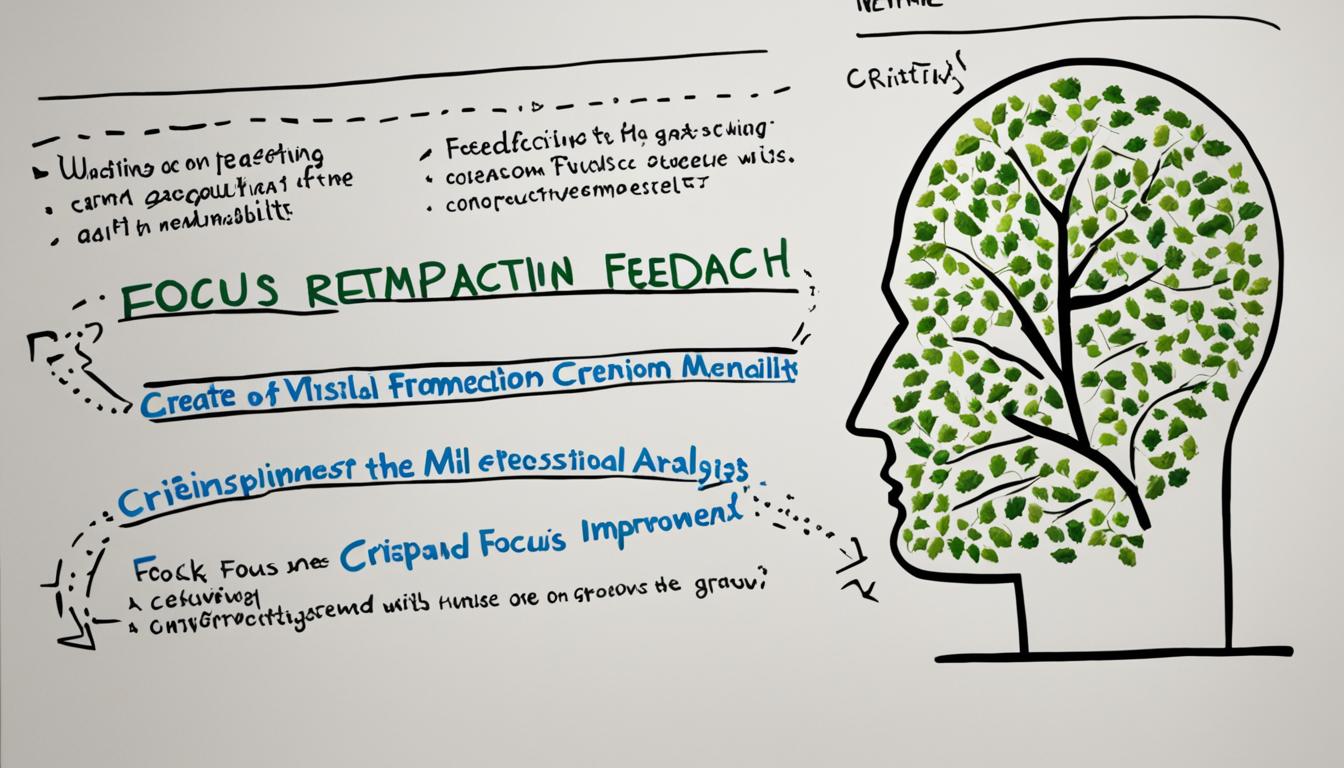Welcome to our insightful article on using feedback and analysis for mental improvement. In this piece, we will explore various techniques and strategies for leveraging feedback to enhance your mental skills, achieve cognitive growth, and improve overall mental wellness.
Feedback is a powerful tool that allows us to identify areas for improvement and optimize our mental performance. By analyzing feedback, we can gain valuable insights into our strengths and weaknesses, enabling us to make informed decisions for personal development.
In this article, we will dive into the importance of self-assessment for mental development, the power of positive feedback in driving progress, and effective strategies for analyzing feedback to enhance your mental skills. We believe that by harnessing the potential of feedback and analysis, you can unlock continuous mental progress and achieve your goals.
Key Takeaways:
- Feedback analysis techniques offer valuable insights for mental self-improvement.
- Self-assessment is a vital aspect of mental development and allows for personalized growth.
- Positive feedback acts as a motivating force and propels mental progress.
- Analyzing feedback helps in identifying patterns and addressing challenges for mental wellness.
- Implementing effective mental feedback strategies enhances overall mental performance.
The Value of Feedback in Mental Growth
Feedback is a powerful tool that plays a crucial role in mental growth and development. By utilizing feedback analysis techniques, individuals can gain valuable insights into their strengths and weaknesses, allowing them to identify areas for improvement. Self-assessment is an essential component of this process, enabling individuals to reflect on their own mental development and progress.
Analyzing feedback is vital for enhancing mental wellness. By carefully evaluating the feedback received, individuals can address any issues or challenges that may be hindering their progress. This analysis helps in identifying patterns and trends, providing valuable information for personal growth and development.
The Importance of Feedback Analysis Techniques
Feedback analysis techniques provide individuals with the tools they need to effectively assess and interpret feedback. These techniques help in understanding the underlying meaning and implications of feedback, enabling individuals to make informed decisions about their mental development.
Feedback analysis allows us to uncover hidden insights and identify areas where we can make significant improvements. It facilitates a deeper understanding of our mental strengths and weaknesses, empowering us to take proactive steps towards personal growth and self-improvement.
Through feedback analysis, individuals can gain a clearer understanding of their mental capabilities and identify strategies to enhance their performance. It also helps in setting realistic goals and benchmarks for growth.
Self-Assessment for Mental Development
Self-assessment is a crucial aspect of mental development. It involves introspection and reflection, allowing individuals to evaluate their own progress and identify areas for improvement. By honestly assessing their strengths and weaknesses, individuals can create tailored plans for personal growth.
Self-assessment not only provides a better understanding of one’s abilities but also fosters a sense of self-awareness and self-accountability. It serves as a powerful tool for unlocking potential and achieving higher levels of cognitive development.
By combining self-assessment with feedback analysis techniques, individuals can gather a comprehensive view of their mental well-being and identify specific areas for improvement.
Analyzing Feedback for Mental Wellness
Analyzing feedback is essential for maintaining mental wellness. It allows individuals to identify factors that contribute to their well-being and those that may hinder their progress. By carefully examining feedback, individuals can take proactive measures to address challenges and improve their overall mental performance.
Regular analysis of feedback promotes a growth mindset and encourages continuous personal development. It enables individuals to adapt and evolve by incorporating constructive feedback into their daily lives.
The Power of Positive Feedback
Positive feedback plays a crucial role in enhancing mental skills and driving feedback-driven mental progress. It acts as a motivator, boosting confidence and self-belief, which are essential for personal growth. By analyzing positive feedback, individuals can identify their strengths and capitalize on them through targeted analysis.
When we receive positive feedback, it provides us with valuable insights into our achievements and abilities. It validates our efforts and encourages us to strive for even greater success. By acknowledging and analyzing positive feedback, we can gain a deeper understanding of our strengths and how they contribute to our overall mental development.
“Positive feedback fosters an optimistic mindset and creates a positive environment for mental growth.”
Understanding our strengths gives us the confidence to take on new challenges and pursue further growth. It encourages us to expand our mental skills and push beyond our comfort zones. Through targeted analysis of positive feedback, we can develop strategies to enhance our existing strengths, capitalize on opportunities, and overcome any barriers that may hinder our progress.
Positive feedback not only impacts our individual growth but also fosters a positive environment for the overall mental well-being of communities and organizations. When individuals receive positive feedback, it facilitates a supportive atmosphere that encourages collaboration, innovation, and continued improvement.
“Positive feedback is a catalyst for personal and collective growth.”
Ultimately, the power of positive feedback lies in its ability to drive feedback-driven mental progress. By embracing and leveraging positive feedback, individuals can harness their strengths, enhance their mental skills through analysis, and embark on a journey of continuous self-improvement.
Remember, every positive feedback you receive is a testament to your growth and potential. Embrace it, analyze it, and let it propel you towards greater mental development.
| Benefits of Positive Feedback: | Impact on Mental Development |
|---|---|
| Boosts confidence and self-belief | Encourages individuals to strive for success |
| Validates achievements and efforts | Provides insights into strengths |
| Fosters an optimistic mindset | Cultivates a positive environment for growth |
| Encourages collaboration and innovation | Facilitates collective growth and development |
Positive feedback is a powerful tool for enhancing mental skills and promoting personal growth. By embracing and analyzing positive feedback, individuals can harness their strengths, foster an optimistic mindset, and create a positive environment for mental development.
Self-Assessment for Mental Development
Self-assessment is a powerful tool for personal growth and cognitive development. By engaging in self-reflection and self-evaluation, we gain valuable insights into our own mental journey. It allows us to pause, introspect, and understand our strengths and weaknesses, paving the way for targeted improvement.
When combined with feedback analysis techniques, self-assessment becomes an even more effective strategy for mental development. By analyzing feedback, we can validate our self-assessment and identify areas that require attention. This synergy between self-assessment and feedback analysis empowers us to create a personalized plan for mental growth and progress.
Self-assessment is a proactive approach to our mental development. It enables us to take ownership of our growth, identify areas for improvement, and set realistic goals for enhancing our skills and abilities. By regularly engaging in self-assessment, we ensure that our cognitive growth remains on track and aligned with our aspirations.
| Benefits of Self-Assessment for Mental Development | How to Implement Self-Assessment |
|---|---|
|
|
Self-assessment is a journey of self-discovery and growth. It enables us to tap into our full potential and continually strive for cognitive excellence. By embracing self-assessment and leveraging feedback analysis techniques, we embark on a path of lifelong learning and personal development.

Analyzing Feedback for Mental Wellness
As we continue on our journey of mental self-improvement, it is crucial to emphasize the importance of analyzing feedback for our overall mental wellness. By carefully examining the feedback we receive, we can gain valuable insights into our strengths, weaknesses, and areas that require attention. This analysis serves as a guiding light towards improving our mental performance and addressing any challenges that may arise along the way.
When we actively engage in the process of analyzing feedback, we open ourselves up to a realm of possibilities for growth and progress. Through introspection and observation, we can identify patterns in the feedback we receive, giving us a deeper understanding of ourselves and our unique mental makeup.
“Feedback is a mirror that reflects our mental journey, illuminating the path towards self-discovery and improvement.”
By using feedback as a tool for self-improvement, we empower ourselves to make transformative changes and constantly evolve for the better. It allows us to gain clarity on areas where we excel and those that require further attention. This continuous feedback-driven mental progress keeps us motivated and focused on our personal growth.
In our quest for mental wellness, the process of analyzing feedback helps us to stay on track and remain accountable. It acts as a roadmap, guiding us towards improvement by highlighting the areas that need our attention the most. By acknowledging and addressing these challenges, we can proactively work towards improving our mental performance.
As we embark on this journey, it is essential to remember that mental wellness is not a destination but rather an ongoing process. By analyzing feedback and making the necessary adjustments, we ensure that our mental well-being remains at the forefront of our priorities.
Let us now delve into the specifics of how analyzing feedback can contribute to our mental wellness and provide us with the tools we need for improving our mental performance.
Key Benefits of Analyzing Feedback for Mental Wellness
| Benefits of Analyzing Feedback | Explanation |
|---|---|
| Identification of patterns | Analyzing feedback helps us identify recurring patterns and behaviors that may impact our mental well-being. |
| Targeted improvement | By pinpointing specific areas for improvement through feedback analysis, we can focus our efforts on enhancing our mental performance. |
| Addressing challenges | Feedback analysis allows us to address any challenges or obstacles that hinder our mental progress, ensuring continuous growth. |
| Self-awareness | Through feedback analysis, we gain a deeper understanding of ourselves, fostering self-awareness and personal growth. |
| Motivation and encouragement | By utilizing feedback as a source of motivation and encouragement, we can stay inspired on our journey towards mental wellness. |
As we explore the techniques and strategies for analyzing feedback, we will uncover valuable insights that will pave the way for a fulfilling mental wellness journey. Let us now dive deeper into the process of improving our mental performance through effective feedback analysis.
Strategies for Effective Mental Feedback
To make the most of feedback for mental improvement, it’s essential to employ effective mental feedback strategies. These strategies involve analyzing feedback, identifying patterns, and setting specific goals for mental growth. By enhancing mental skills through targeted analysis, individuals can improve their overall mental performance and achieve their desired outcomes. These strategies provide a roadmap for continuous mental improvement.
The Power of Analysis
Analysis is a key component of effective mental feedback strategies. By carefully examining feedback received, individuals can gain valuable insights into their mental strengths and areas for improvement. Analyzing feedback allows us to identify patterns and recurring themes, helping us develop a deeper understanding of our mental performance. This deeper understanding enables us to set specific goals and take targeted actions to enhance our mental skills.
Setting Specific Goals
Setting specific goals is crucial in leveraging feedback for mental improvement. Without clear goals, feedback can become overwhelming and lack direction. By setting specific objectives, we can focus our mental energy on areas that need improvement, making the feedback analysis process more effective. Specific goals also allow us to measure our progress and track our development over time.
Creating Action Plans
Once we have analyzed feedback and set specific goals, it’s essential to create action plans to guide our mental improvement journey. Action plans outline the steps we need to take to enhance our mental skills and achieve our desired outcomes. These plans break down the feedback analysis process into actionable tasks, making it easier to implement changes and monitor progress.
Continual Evaluation and Adjustment
Effective mental feedback strategies involve continual evaluation and adjustment. As we progress on our mental improvement journey, it’s crucial to regularly reassess our goals, action plans, and feedback analysis techniques. By evaluating our progress and making necessary adjustments, we can ensure that our mental improvement efforts remain relevant and aligned with our evolving needs.
“Effective mental feedback strategies involve continual evaluation and adjustment.”
| Key Strategies | Benefits |
|---|---|
| Analyzing feedback | – Gain insights into mental strengths and areas for improvement – Identify patterns and recurring themes – Develop a deeper understanding of mental performance |
| Setting specific goals | – Focus mental energy on areas needing improvement – Measure progress and track development |
| Creating action plans | – Outline steps for enhancing mental skills – Implement changes and monitor progress |
| Continual evaluation and adjustment | – Ensure mental improvement efforts remain relevant – Adapt to evolving needs |
By following these strategies for effective mental feedback, we can maximize the benefits of feedback analysis and enhance our mental performance. Leveraging analysis, goal-setting, action planning, and continual evaluation, we can continuously improve our mental skills and achieve our desired outcomes.

The Benefits of Continuous Mental Progress
Embracing continuous mental progress has numerous benefits. By consistently analyzing feedback and utilizing feedback analysis techniques, individuals can continuously improve their mental skills and abilities. This leads to enhanced mental self-improvement and overall personal growth. Continuous mental progress ensures that individuals are always striving to reach their full potential and achieve higher levels of cognitive development.
The Power of Consistency
Consistently analyzing feedback is key to continuous mental progress. By regularly reviewing feedback received from various sources, individuals can identify recurring patterns and areas for improvement. This consistency allows for targeted analysis, addressing specific areas of mental development and promoting continuous growth.
Unleashing Full Potential
Continuous mental progress enables individuals to unlock their full potential. Through feedback analysis techniques, individuals can identify their strengths and weaknesses, allowing them to focus their efforts on enhancing their mental skills. By consistently working on these areas, individuals can achieve higher levels of cognitive ability and reach new heights of personal and professional success.
Adaptability and Resilience
Continuously improving mental skills enhances adaptability and resilience. By analyzing feedback and incorporating insights into their approach, individuals can adapt to new challenges and bounce back from setbacks more effectively. This adaptability and resilience are essential in navigating the complexities of today’s fast-paced and ever-changing world.
Continuous Growth and Personal Fulfillment
Engaging in continuous mental progress brings a sense of personal fulfillment. By actively working on self-improvement and constantly striving to enhance mental skills, individuals experience a sense of growth and accomplishment. This continuous growth leads to personal fulfillment and a deep satisfaction in knowing that they are actively investing in their own well-being and development.
Continuous mental progress is a journey that requires dedication, self-awareness, and a commitment to ongoing improvement. By embracing feedback analysis techniques and consistently working towards enhancing mental skills through analysis, individuals can experience the many benefits of continuous mental progress.
Conclusion
Harnessing feedback and analysis for mental improvement is a powerful tool for personal growth and cognitive development. Through the use of effective mental feedback strategies, such as analyzing feedback and engaging in self-assessment, individuals can continuously enhance their mental skills and drive positive cognitive growth.
By actively incorporating feedback analysis techniques into their routine, individuals can identify areas for improvement and create personalized plans for mental development. This self-driven approach allows for continuous progress and empowers individuals to achieve their desired outcomes.
Embracing continuous mental progress leads to enhanced cognitive growth through feedback analysis. It ensures that individuals are always on the path to self-improvement and are able to reach their full potential. With the power of feedback and analysis, the possibilities for enhancing mental skills are endless.
FAQ
How can feedback be used for mental improvement?
Feedback can be used for mental improvement by analyzing it to identify areas for improvement and enhance mental performance. It helps individuals understand their strengths and weaknesses and address any challenges that may be hindering their progress.
What is the value of feedback in mental growth?
Feedback plays a crucial role in mental growth as it allows individuals to understand their own development. By utilizing feedback analysis techniques and engaging in self-assessment, individuals can identify areas that need improvement and create a personalized plan for mental development.
How does positive feedback contribute to mental progress?
Positive feedback acts as a motivator and boosts confidence. By analyzing positive feedback, individuals can identify their strengths and enhance their mental skills through targeted analysis. It also promotes an optimistic mindset and fosters a positive environment for mental growth.
What is self-assessment for mental development?
Self-assessment is a vital tool for mental development. It involves self-reflection and self-evaluation to gain insights into one’s own cognitive growth. By combining self-assessment with feedback analysis techniques, individuals can identify areas for improvement and actively work towards enhancing their skills and abilities.
How can analyzing feedback contribute to mental wellness?
Analyzing feedback helps individuals identify patterns and areas that may be affecting their mental well-being. This analysis helps in improving mental performance and addressing any challenges that may arise. By using feedback as a tool for self-improvement, individuals can ensure continuous progress in their mental wellness journey.
What are some strategies for effective mental feedback?
Effective mental feedback strategies involve analyzing feedback, identifying patterns, and setting specific goals for mental growth. By enhancing mental skills through targeted analysis, individuals can improve their overall mental performance and achieve their desired outcomes.
What are the benefits of continuous mental progress?
Continuous mental progress ensures that individuals are always striving to reach their full potential and achieve higher levels of cognitive development. By consistently analyzing feedback and utilizing feedback analysis techniques, individuals can continuously improve their mental skills and overall personal growth.



